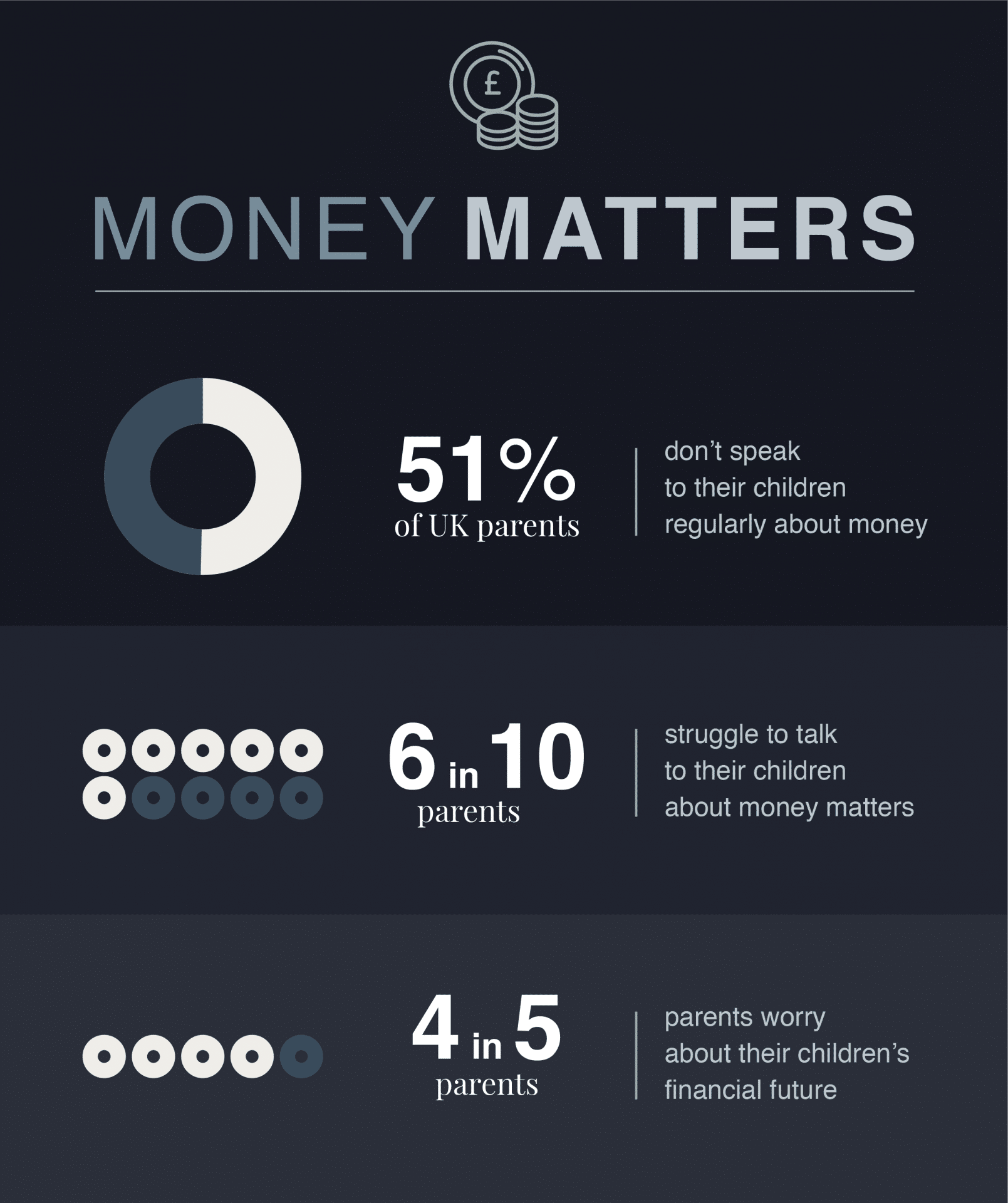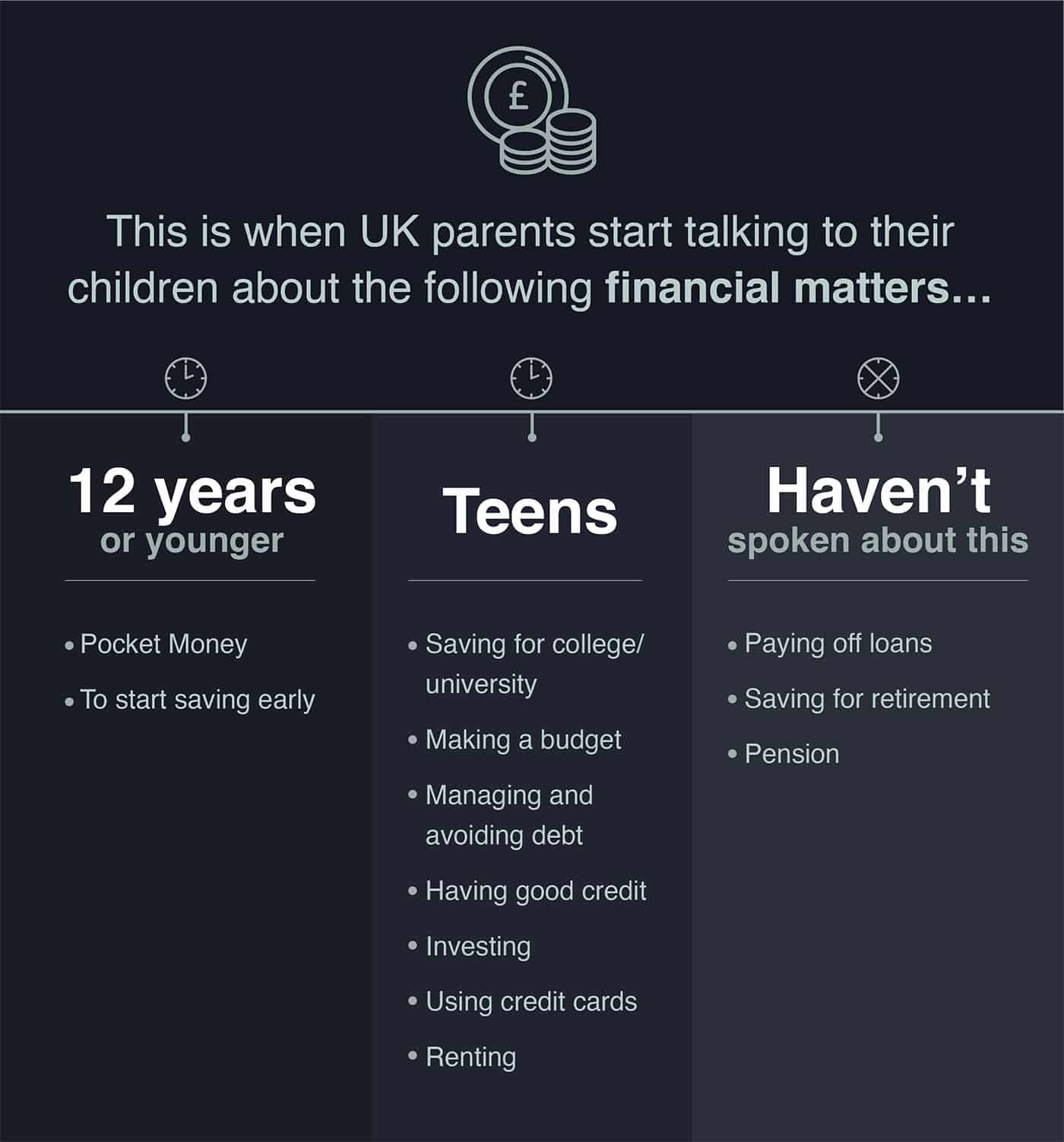The concept of money and saving is a crucial part of being financially independent and responsible. However, after surveying 1,500 UK parents, Blacktower has revealed that too many mums and dads are neglecting their duty to educate their children about money matters.
Reading on, discover why so many parents feel uncomfortable discussing finances with their children, at what point the conversation arises in most families, and our top tips for educating children about money.
Half of UK parents struggle to talk to their children about money

Recent Blacktower survey data has revealed that an astonishing 51% of UK parents struggle to talk to their children about money matters, while 6-in-10 parents (63%) do not regularly discuss finances as a family.
Intriguingly, this contradicts the fact that 4-in-5 (78%) worry about their child’s financial future, while a similar number (79%) believes they are the biggest influencer over the development of their child’s money management skills. Survey data also reveals an additional 84% of parents appreciate the importance of helping children learn about money. So, despite all of this, why do parents still find it so hard to discuss savings with their children?
Firstly, 59% of parents believe their children should grow up blissfully unaware of how and why it is important to start saving. This is a pleasant theory, but a lack of understanding around basic finances can leave children falling behind as they grow up and struggle to manage savings and outgoings. For instance, just two thirds of parents (68%) give their children pocket money to teach financial responsibility.
Additionally, half of UK parents (48%) blame their hesitancy on their own experiences growing up, claiming their parents never gave them money advice as a child. When it comes to talking about inheritance, parents struggle even further; for 57%, discussing wills with their children is much too uncomfortable of a conversation.
If there’s a lesson to be taken from the recent survey data, however, it is that an incredible 6-in-10 (59%) parents regret not speaking to their children about crucial money matters earlier in life.
At what point are parents discussing money with their children?

As far as money management is concerned, an impressive 72% of parents plan to talk to their children about pocket money before they reach the age of 12. However, the notion of financial responsibility will be lost on many growing up, with less than half of UK parents (43%) prepared to go as far as to discuss the importance of saving with their pre-teens.
In isolation, this may not seem too disastrous. However, when partnered with the fact that two thirds of parents (62%) don’t plan to have a conversation with their children about rent and half (46%) won’t ever discuss the funds involved in buying a car, the financial future begins to look bleak for the next generation of reckless spenders.
Our research also reveals that only half of parents plan to sit their children down as teenagers to talk about saving for university, with a further quarter not planning to speak on the subject at all. As far as budgeting goes, only half of parents (46%) across the UK will talk through sensible money management with their teenage children, while a similarly low 51% will discuss the importance of avoiding debt.
In adulthood, having a strong credit score helps when it comes to making big purchases, such as property. However, again, just half of parents (49%) will discuss the benefits of a good credit rating, while only 47% will talk to their children about using credit cards. Similarly, more than a third of children (35%) will grow up without being educated about the importance of paying off loans.
Investing is also something that crops up in adulthood and having a strong understanding of how to make your money go further can be of great benefit. However, just a third of parents (32%) plan to talk through investments with their teenage children, and, damningly, 30% more won’t discuss the benefits and risks at all. Similarly, over a third of UK parents haven’t yet discussed the prospect of saving for retirement (36%) or establishing a pension scheme (35%), with their children.
Top tips for educating children about money
Talking to children about money is a crucial step in their development and helps them to become independent as they grow up. However, not enough parents are discussing the importance of saving or paying people back. To make this a little easier, we’ve outlined our top three tips for educating children about money:
- Take your children shopping
Letting your children accompany you when you visit the supermarket can be a great lesson in money management. Let them pick what they want to eat for lunch over the next week, but set a spending cap. For instance, they may have to choose between fruit or chocolate. Not only does this help them learn about budgeting, but they’ll also develop an idea about value. - Let your children make mistakes
The best way for children to grow and mature is to let them make their own mistakes. Watch from afar and let them spend their pocket money how they please. As and when they run out, and come to you for more, talk to them about why it’s important not to spend all your money at once. The more freedom you give them, the more responsibility they’ll begin to take over their own money. - Introduce cash at an early age
The best possible way you can educate your children about money is to introduce the concept at an early age. Traditionally, children are first exposed to saving with piggy banks. These are a great idea, because they allow children to develop a great feeling about finally reaching a certain amount, which will carry through to adolescence and adulthood.
Money management and saving skills are crucial, for children and adults alike. Discover how you can make your money go further or discover the latest news in the world of finance.
